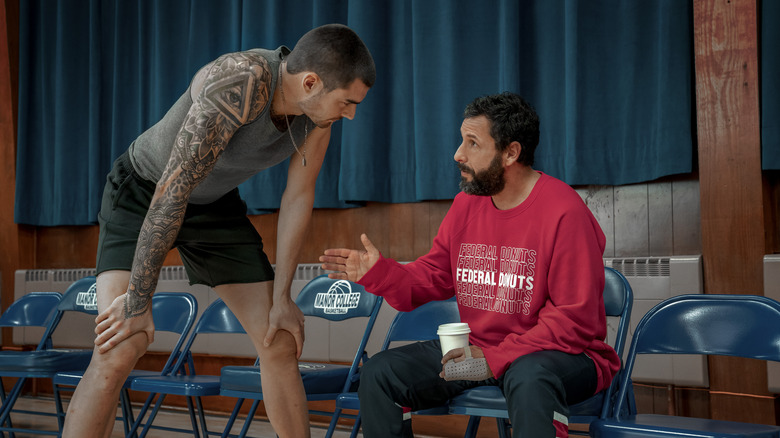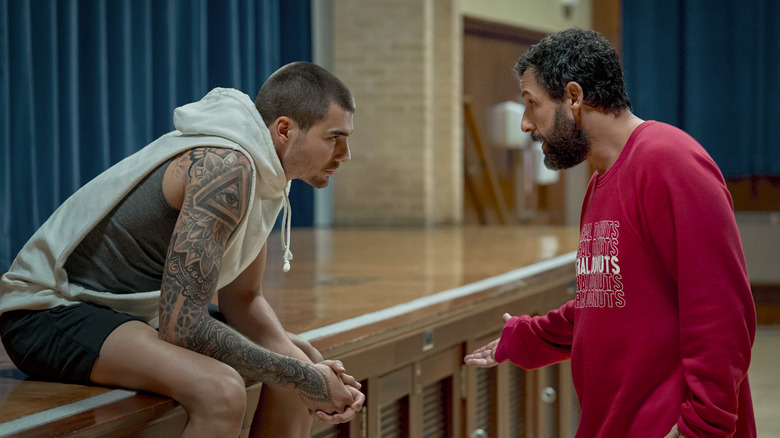Hustle Review: A Predictable Underdog Sports Story That Still Manages To Charm
It seems to happen every few years. Adam Sandler will emerge from his wacky, irreverent comedies that double as all-expense-paid vacations for himself and his buddies and make a serious movie. The type of movie that reminds us that Sandler is actually a pretty darn good actor when he wants to be. The most recent example was the anxiety-inducing "Uncut Gems," which saw the Sand Man actually chasing Oscar gold (he ultimately didn't get nominated, though he probably should have). Of course, the irony is that every time Sandler dips into "serious mode," he's basically playing a more realistic version of the angry, shouty, silly man-children he plays in his comedies. It's just that the setting he finds himself in is more grounded; less ridiculous.
Sandler's latest serious turn is "Hustle," a formulaic underdog sports story that still manages to charm. There are no real surprises here; nothing you haven't seen in at least a dozen other sports flicks before. Indeed, "Hustle" often feels like it's following in the footsteps of "Rocky," or more precisely, "Creed." There's the former sports player now washed up and acting as a coach. There's the exciting young star who has a world of talent and a world of personal problems. And there's a chance at redemption for everyone. It's probably no coincidence that "Hustle" is primarily set in the "Rocky"/"Creed" stomping grounds of Philadelphia.
In "Hustle," Sandler is Stanley Sugarman, a scout for the Philadelphia 76ers. He never wanted to be a scout, but he somehow fell into that role, hired by the team's owner, played by Robert Duvall in a quick, stoic cameo. Stanley played college ball until a hand injury ended his career. He dreams of being a coach, and after years of being on the road and missing his family, he finally gets his wish when he's named an assistant coach of the team. But the coaching gig is short-lived. When the team falls into the hands of the owner's greedy, stupid son (Ben Foster, appropriately smarmy), Stanely is forced to go back to scouting in order to bring the Sixers a mega-star. His wife Teresa (Queen Latifah, warm in an underwritten role) asks him why he's willing to be pushed around, and wants to know why he's going to give up on his coaching dreams. "Guys in their 50s don't have dreams," Stanely says. "They have nightmares. And eczema." It sums up his overall outlook: he's a sad, shuffling man who feels like the best years of his life are behind him. And maybe, just maybe, he can achieve one last bit of glory by finding a great ballplayer.
Charm and style
That player turns out to be Bo Cruz, played by real NBA player Juancho Hernangómez. When sports stars turn to acting, it doesn't always work out well, but Hernangómez, while a little stiff from time to time, is something of a natural. Even his stiffness contributes to his performance. He's likable and affable but awkward, and his athleticism is often staggering. Stanely spots Bo during a street basketball game in Spain, where the towering amateur rockets around the court wearing work boots instead of sneakers. Bo is a hustler, using his basketball skills to earn extra cash. He lives with his mother and daughter, and despite his massive talent, has never thought he could be a professional player.
Stanley sees the kid as a unicorn, and also his ticket to greatness. He figures if he can bring Bo to the Sixers, the team will win big — and, best of all, Stanley can get back to coaching. But the team doesn't want Bo. It doesn't help that he has a criminal record and a seemingly violent temper. Not to be dissuaded, Stanley arranges to bring Bo back to Philadelphia on his own dime, with the hope that Bo will get drafted once everyone sees how good he is.
If you've seen one sports movie about a mentor and mentee, you can probably guess where things go from here. Despite his natural talents, Bo struggles on the court, and he and Stanley have to work hard to mold the young player into a sports legend. And does Bo's hustling come back around to help him in the end? And does Stanley find a new lease on life? Well ... what do you think? There will be absolutely no surprises here, and telling you that now isn't a spoiler. And yet, I'm not saying "Hustle" should be easily written off.
For one thing, Jeremiah Zagar's direction is surprisingly energetic. A lot of Sandler's films have a point-and-shoot aesthetic, but "Hustle" has a frenetic style, with the basketball scenes bursting with inventive electricity. The camera gets low, swoops down the court, gets directly into players' faces. There are a lot of training montages here — it feels like 45% of the movie is made up of training montages — and yet they're shot in such a vibrant, exciting style that you can't help but get swept up in it all. And then there's Sandler, who anchors the film with his hang-dog performance. He's pretty much aged out of his man-child era and settles nicely into the role of a mopey guy who still has a funny quip or two. At times, some of the worst instincts of Sandler's comedies — like a propensity for awkward, scene-breaking cameos (there are a ton of basketball player cameos here) — get in the way. But "Hustle" manages to get by on charm and style, and Sandler gets to remind us again that he has range. "Hustle" isn't a slam-dunk, but it still takes it to the hoop.
/Film Rating: 6 out of 10

